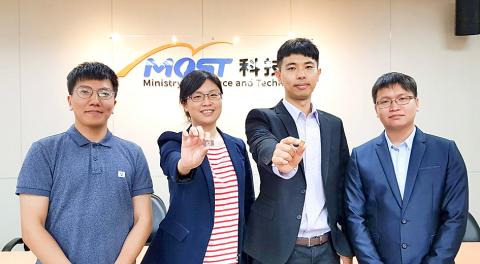A team led by National Cheng Kung University (NCKU) physicists yesterday announced a major breakthrough regarding a next-generation memory storage material that is expected to multiply the efficiency of memory units and pave the way for quantum technology development.
Traditional memory devices process information based on two logic states — zero and one — while their efficiency can be improved only by increasing the density of components and reducing their size, department of physics assistant professor Yang Jan-chi (楊展其) said.
To eliminate the bottleneck in memory development, the team turned to an alternative material — bismuth ferrite (BiFeO3), a material that can record eight logic states and keep the stored information for up to a year even when it is not powered or is heated up to 400°C, Yang said.

Photo: Chien Hui-ju, Taipei Times
The main breakthrough involves controlling the material through laser illumination, which helps reduce delays in the reading of data and energy consumption, while boosting calculation efficiency, he said.
No other researchers have attempted to control high-density memory material using optical means, he said.
Yang, 32, is also enrolled in a Ministry of Science and Technology young talent cultivation program.
The development of BiFeO3 largely remains at the level of academic research and the team has found that the light-driven flexoelectric effect is key to its manipulation, professor Chen Yi-chun (陳宜君) said.
As light presents alternating electromagnetic fields, it is seldom used to control the operations of memory materials, she said.
Nonetheless, the team found that the material’s operations could be manipulated when placed on a surface whose strain gradient is slightly altered by illumination, she said.
The findings were detailed in a paper titled “Deterministic optical control of room temperature multiferroicity in BiFeO3 thin films,” published in the journal Nature Materials on May 6.
The team submitted the manuscript in July last year and it was accepted in March, Chen said.
The team expressed gratitude to collaborators at Hsinchu-based National Synchrotron Radiation Research Center and National Chiao Tung University, as well as members from Germany’s Max-Planck Institute for Chemical Physics of Solids, the University of Texas at Arlington and Lawrence Berkeley National Laboratory, and the University of New South Wales.
While more time is needed before the technology becomes commercially applicable, its discovery brings the nation a step closer to quantum computing technology, which would require highly efficient calculating units, NCKU vice president for research and development Hsieh Sun-yuan (謝孫源) said.

Chinese spouse and influencer Guan Guan’s (關關) residency permit has been revoked for repeatedly posting pro-China videos that threaten national security, the National Immigration Agency confirmed today. Guan Guan has said many controversial statements in her videos posted to Douyin (抖音), including “the red flag will soon be painted all over Taiwan” and “Taiwan is an inseparable part of China,” and expressing hope for expedited reunification. The agency last year received multiple reports alleging that Guan Guan had advocated for armed reunification. After verifying the reports, the agency last month issued a notice requiring her to appear and explain her actions. Guan

GIVE AND TAKE: Blood demand continues to rise each year, while fewer young donors are available due to the nation’s falling birthrate, a doctor said Blood donors can redeem points earned from donations to obtain limited edition Formosan black bear travel mugs, the Kaohsiung Blood Center said yesterday, as it announced a goal of stocking 20,000 units of blood prior to the Lunar New Year. The last month of the lunar year is National Blood Donation Month, when local centers seek to stockpile blood for use during the Lunar New Year holiday. The blood demand in southern Taiwan — including Tainan and Kaohsiung, as well as Chiayi, Pingtung, Penghu and Taitung counties — is about 2,000 units per day, the center said. The donation campaign aims to boost

The Kaohsiung Tourism Bureau audited six hotels in an effort to prevent price gouging ahead of Korean band BTS’ concert tour in the city scheduled for Nov. 19, 21 and 22 this year. The bureau on Friday said that the audits — conducted in response to allegations of unfair pricing posted on social media — found no wrongdoing. These establishments included the local branches of Chateau de Chine, Hotel Nikko, My Humble House, and Grand Hai Lai, it said, adding that the Consumer Protection Commission would have penalized price gougers had the accusations been substantiated. The bureau said the Tourism Development Act

The Central Weather Administration (CWA) said a magnitude 4.9 earthquake that struck off the coast of eastern Taiwan yesterday was an independent event and part of a stress-adjustment process. The earthquake occurred at 4:47pm, with its epicenter at sea about 45.4km south of Yilan County Hall at a depth of 5.9km, the CWA said. The quake's intensity, which gauges the actual effects of a temblor, was highest in several townships in Yilan and neighboring Hualien County, where it measured 4 on Taiwan's seven-tier intensity scale, the CWA said. Lin Po-yu (林柏佑), a division chief at the CWA's Seismological Center, told a news conference